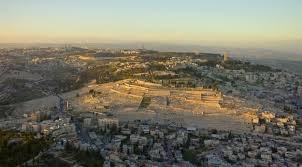Welcome to Holy Tuesday, the third day of the Great Week. For Egeria this day mirrored yesterday except for the very end. She describes a special hike after the final evening blessing back up Mount Olivet to a small church near the Gethsemane, very late, as Bishop Cyril read from the Gospel of Matthew by candlelight. The passage, Matthew 24:1 to 26:2, is Jesus’ teaching about the End of Days, concluding with Jesus’ plaintive statement, After two days the Passover is coming, and the Son of Man will be handed over to be crucified. Cyril has taken the assembly to the very spot, or close to it, where Jesus stood to deliver this graphic prophecy! While the Episcopal Church’s Sunday lectionary cites the end of this passage on the final Sunday of the Christian year, around Thanksgiving, I think Cyril had it right. This section, filled with amazing parabolic imagery, apocalyptic drama and last judgement, functions as an echo to Matthew’s earlier Sermon on the Mount narrative. Except this time, we are not overlooking the lazy, rolling Galilean hills towards the cerulean blue of the Sea of Galilee, but rather hung on a craggy, steep and unsteady Judean foothill laced with olivewood tree farms overlooking the bleached stone of Jerusalem. It’s not day, but night and more darkness on the way. It’s not soaring rhetoric but short, intensive blasts of reality. Sound familiar?

This Prophecy on the Mount ends with Jesus’ vivid description of divine jurisprudence, the separation of the sheep from the goats. Sheep: Inherit the Kingdom prepared for you from the foundation of the world. If you did these things to the least of these, you actually offered that service to me! Goats: Depart from my face straight into eternal fire reserved for Satan and its rebellious angels. You did nothing for the least of these and so you never gave me the time of day. For years I wrestled with this passage, exegeting it and parsing it and trying to ignore it. Cyril knows better. I want to make justifying lists to prove to God just how awesome I have been to so many. Egeria knows better.
Just recently I was given a different perspective on this reading, which can function parabolically also if we allow it. In a parable one can take the perspective of any figure in the story. For example, instead of naturally assuming the first early morning laborers in Jesus’ disturbing story about all the workers being paid equally despite working different lengths of shift, I assume the place of those hired in late afternoon. I am being overpaid ridiculously! It changes the entire parable, and so does being the Father in the Prodigal, the women who show up late and low in the lamp oil, and being the one idiotic sheep who decides to leave the safety of the flock to be a rugged, if momentary, individualist! So….instead of worrying tonight about whether or not I provide wool or have horns (presumably why Satan is pictured with horns, by the way), what if I place myself in this dramatic picture as the least of these??!! The one who needs to be clothed, fed, visited, protected, companioned, comforted?! For me that dizzying change in perspective instantly transforms the theological landscape…I approach God with such profound gratitude for the many who took time to treat me like an actual human, to invest and wrestle and fight for my soul, to simply be with me when I was flattened by life and not worth even seeing, those who could give a _____ if I was the best or the worst or the least. Those who showed me God’s love unconditionally.
- Yep, you guessed it! About 9 PM, I will light a candle in my prayer space and read audibly Matthew 24:1 to Matthew 26:2. Would you join me in your prayer space also?
- Who are your sheep? We certainly can all immediately list the goats but since we are Anglicans let’s not go there! Who are your sheep? Can we together give God profound gratitude for those who have loved us and provisioned us, living or dead, tonight?
- How does this reading, and this experience, prepare us for the remaining Great Week?



